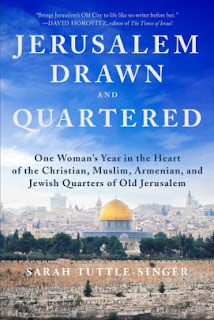 Writing about Sarah Tuttle-Singer's work sometimes gets me into trouble. Perhaps that is why it is fun.
Writing about Sarah Tuttle-Singer's work sometimes gets me into trouble. Perhaps that is why it is fun.Her Jerusalem Drawn and Quartered: One Woman's Year in the Heart of the Christian, Muslim, Armenian, and Jewish Quarters of Old Jerusalem is a poignant and transgressive memoir. It is about love and hatred, happiness and pain and family. This book is very personal and Tuttle-Singer writes in a casual style about her life as a young woman who recently made aliyah. She attempts, layer by layer, to expose her feelings and her life from her journey as a blondie Jewish kid growing up around Los Angeles grappling with the fact that she watched her mother die from cancer.
It is a story of growing into adulthood in the Old City with two children, an absent ex-husband, a rapist, Arab stone-throwers, taxi-drivers with opinions, and the never-ending conflict before her eyes as she explores Jerusalem, sometimes by rooftop at midnight, as the new media editor for the Times of Israel.
Tuttle-Singer is (or was) torn by the fact that her son will shortly be called into the IDF. As a Californian Jew and Israeli who cares about the Jewish people, she is ripped between love and fear. I cannot begin to imagine what that must feel like. Tuttle-Singer knows that she is raising her children in a wild part of the world and shortly she will probably give up her young son to the Israeli military.
The value of Jerusalem Drawn and Quartered is that it is deeply personal. This book is not a political analysis, although it has definite political implications. It is not a history text, although history darkly hovers in the background. It is a memoir of a young Jewish woman learning about Israel and the Old City through exploration from childhood to adulthood. This is a painful story of a woman who has devoted herself to understanding what it means to be a Jew and to raise her children within Eretz Israel.
I have written about Sarah Tuttle-Singer before and although we are not friends, we are certainly not enemies. She is also despised by many who I know within the Jewish community, both Israeli and diaspora. Nonetheless, this is a book that should be read because it is honest, from the heart, and intelligent.
Naturally, this does not mean that I do not have my criticisms.
The virtue of Tuttle-Singer's writings is her appeal to basic human decency and her joy in social exploration. She is a hopeful "progressive" raising two children in Israel and what she wants more than anything is peace. Who doesn't? One of the difficulties with Tuttle-Singer's writings, however, is in the grey line between beautiful description and hyperbole. She is excellent at the former but often wanders into the latter, but that is a minor criticism. What she struggles with most is -- aside from her rape by the "Grey Man" in Jerusalem and the death of her mother -- is finding a balance within the never-ending conflict between Israeli Jews and Israeli Muslims.
The blood and the murder and the intifadas are always present in the background. Her fear for her own children is always there. Where she seems to find healing is in the gold between the cracks. Among the themes of this book this one struck me as central:
"Do you know what they do with broken objects in Japan?" my mom had asked me after my first heartbreak, when I lay in bed staring at the ceiling, my heart shattered into several jagged pieces. "They don't throw them away, sweet girl. They repair them. They melt gold and mend the everyday clay objects with the precious modern material."
This is precisely what Tuttle-Singer is endeavoring to do with her book. She wants very much to heal "the broken places" with "gold," i.e., with human decency and understanding because not only does it make it more beautiful, but stronger, as well.
What saddens me about Tuttle-Singer's writings, both in this book and in her Times of Israel column, is that there are reasons why she is not well-liked among many within the pro-Jewish / pro-Israel community. The primary reason is that she often seems to favor the Arabs over the Jews in terms of "the conflict." I do not doubt that she would take extreme exception with that characterization, but as a progressive defender of the underdog, it is natural as day. The problem is that there are about 400 million Arabs surrounding 7 million Jews who, for the most part, do not want those Jews in their midst.
Sarah does not seem to quite get that.
It, therefore, saddens me that she has earned the malice of many of my friends.
But I also understand why.
They see her as squishy and naive in the face of the enemies of the Jewish people and, thus, she is sometimes not trusted. Some even think of her as a traitor to her own people who has hurt some of our best friends, like Ryan Bellerose.
What I think is that she desperately wants peace -- for the sake of her own children and the Jewish people -- and is willing to bend far-over backward in her political thinking toward that effort. I find her writings to be intelligent, well-meaning, and a little naive, but, heck, she's the one who lives in Israel. I am still in California.
We have lots of ideas, but we need more resources to be even more effective. Please donate today to help get the message out and to help defend Israel.

 Elder of Ziyon
Elder of Ziyon



![[Elder of Ziyon] Facebook may add "Insha'Allah" button for events](https://blogger.googleusercontent.com/img/b/R29vZ2xl/AVvXsEi9KIDYyRBYSDMD-x2PZwXZNYKl0eHCeNWbuEWt6IvsNL6IFhtZTpF2SvNRlui4o-nPTjPMcmSOxJ1nPo0pPGPzI5r7GHO_ZfKV9WUcNnkMeMslnkgWq0GeILJg-5vXLLCLckj6SUmdJqmc/s72-c/arabic_facebook_logo_by_ali_normal-d37tr0q.jpg)



0 comments:
Post a Comment